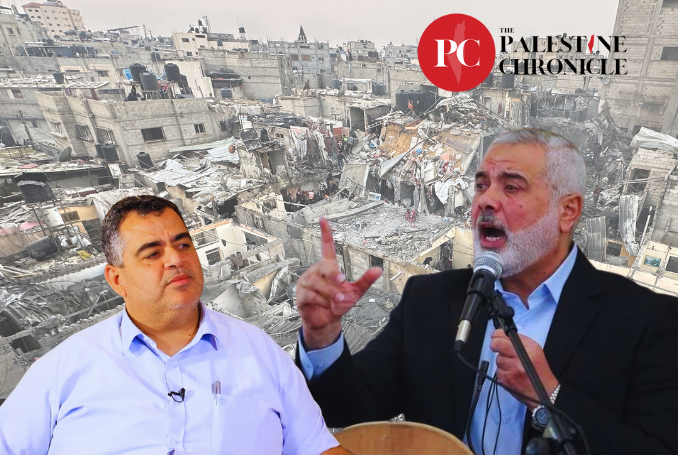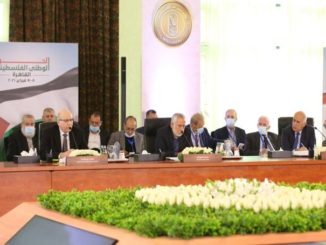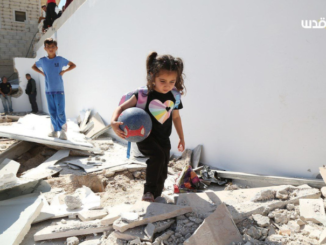
Haniyeh described his father as firm in his principled positions but also as a consensual figure who brought different views together.
Ismail Haniyeh was “the heart that helped anyone who could reach him,” his son said in an exclusive interview with the Lebanese media network Al-Mayadeen, where he spoke about his father the resistant fighter, politician, and human being.
Abdel Salam Haniyeh, the eldest son of the late political leader of Hamas, said that the large numbers of people who took the streets to bid farewell to his father, confirm that Palestine and Jerusalem remain “the compass of this nation, no matter how difficult the circumstances are.”
Ismail Haniyeh, the head of Hamas’ political bureau, was assassinated by an Israeli strike on July 31, in the Iranian capital of Tehran.
‘More than Brothers’
Haniyeh described his father as firm in his principled positions but also as a consensual figure who brought different views together.
Haniyeh told Al-Mayadeen that the founder of Hamas, Sheikh Ahmed Yassin, chose his father to be the closest to him.
Yassin “looked at Abu al-Abed (Haniyeh – PC) as his son, the son of his family, his camp, and his country.”
The young man said that his late father and Yahya Sinwar, who was recently elected as head of Hamas’ political bureau, were “more than brothers.”
Sinwar Elected as Hamas’ New Top Leader – Who He Is and What It Means
Haniyeh told Al-Mayadeen that the two men shared many common aspects as “their youth days at the Islamic University and in this context they were together in the student council and later in Al-Majd apparatus, only to be separated later inside detention.”
He added that his father’s loyalty to his friend was shown in the “Wafa al-Ahrar” deal when Ismail Haniyeh was head of Hamas and the government and he constituted “the umbrella” for the operation under which Gilad Shalit was detained, which later led to a brokered prisoner exchange deal that resulted in the release of Sinwar.
A Special Relationship
Haniyeh told Al-Mayadeen that his father also enjoyed a “special relationship” with the late Palestinian leader Yasser Arafat.
He stressed that the PLO leader “loved the martyr leader with his style and policy,” adding that his father was behind the vision in 1995 and 1996 of “entering the legislative parliament and the authority, and the relationship with the authority.”
‘Right to Self-Defense’ – Why US Continues to See Israel as the Victim (VIDEO)
In the absence of a unified decision within the ranks of Hamas on this issue, Ismail Haniyeh “chose the unity of the movement over his vision,” according to his son.
He went on to explain that his father’s vision was adopted by the movement in 2005 after ten years of him laying the grounds for it.
From Childhood to Martyrdom (Death)
In his interview with Al-Mayadeen, Abdel Salam Haniyeh spoke at length about the upbringing and life of his father in the Al-Shati refugee camp.
“Martyr Haniyeh was known for being a social, sportsman, humanitarian, educational, and jihadist icon” in the multi-factional camp,” Abdel Salam Haniyeh said.
Ismail Haniyeh’s political activism, according to his son, kicked off at the Islamic University where he pursued his studies and was head of the student council in 1985.
He was very involved in the first and second Intifada in 1987 and 1994. In his capacity as one of the leaders of the youth and the Islamic Bloc, the Israeli occupation arrested him for the first time in 1987, only ten days after the outbreak of the Intifada.
Ismail Haniyeh – The Palestinian Refugee Who Became the Political Leader of Hamas
He was put under administrative arrest again in 1989 along with most student councils and national and Islamic action blocs leaders and several leaders of Hamas and Fatah and others. In conjunction with this, Abdul Salam Haniyeh said that his father adopted in his life “the approach of unity, homeland, harmony, and brotherhood.”
In 2004, Ismail Haniyeh became head of Hamas’s political bureau and in 2006 he was appointed prime minister in the Gaza Strip after the elections.
According to his son, Haniyeh never lost his connection to the camp or its people after becoming prime minister. “He utterly refused to leave the camp and it became an embodiment of the core issue of Palestine, which is the refugee issue.”
‘Man of the People’
Ismail Haniyeh’s political position and preoccupations never deterred him from being close to his people, his son said, adding that he often sat in front of his house in the Al-Shati refugee camp in Gaza and played football with the youth or sat in his home with the elders for a chat.
Abdel Salam explained that his father got immense pleasure from helping people. “His home was always open and he never returned anyone who reached out to him empty-handed,” he added. According to him, his father was “the heart that helped anyone who could reach him.”
On a personal level, Abdel Salam Haniyeh stressed that his father was to his children “a loving friend and brother and not just a father and never dealt with them in a language of command and prohibition, but with friendship and love.”
Betrayal of Gaza
However, Haniyeh admitted that his father was angered by the positions of betrayal and the desecration of the Al-Aqsa Mosque.
He was also very saddened by the betrayal towards Gaza following the Al-Aqsa Flood operation on October 7.
Gaza “is being slaughtered from vein to vein, amidst the silence of the international community and some Arab regimes,” he continued.
‘If a Leader Leaves, Another Will Arise’ – Ismail Haniyeh’s Last Words
Haniyeh concluded his interview with Al-Mayadeen by saying that his father “always felt that he would be martyred, and knew that he would leave this world at any moment,” taken he was the subject of four previous assassination attempts.
His only will to his children was “to preserve his legacy of the love of people towards him, and to help people, and to preserve the camp and the unity of our people, our neighborhood, our neighbors and our relatives, and to continue to carry his legacy with his humane and fraternal relationship with all the sons of our Palestinian people,” Abdel Salam Haniyeh concluded.
(PC, Al-Mayadeen)








Iuck Fsrael.